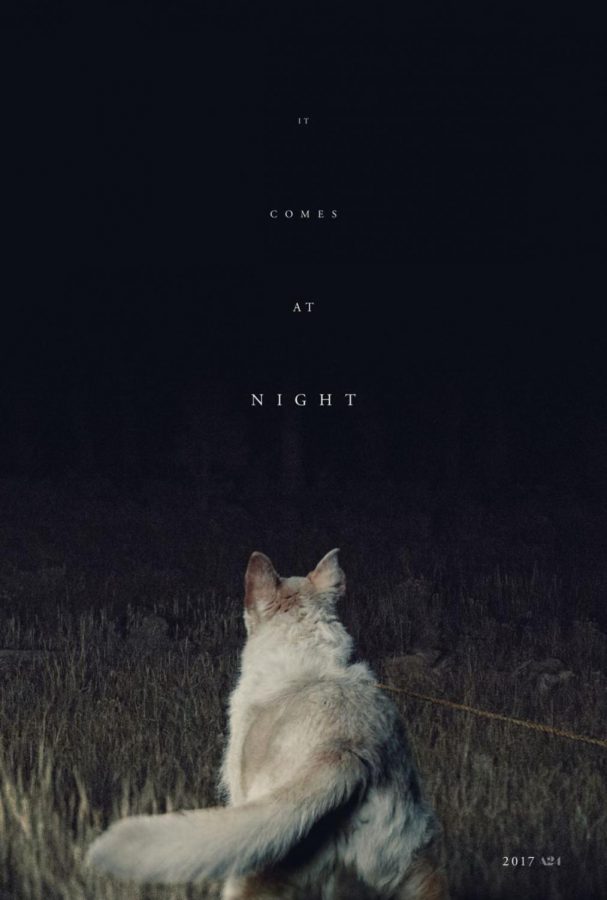‘It Comes At Night’ divides critics, general audiences
June 14, 2017
To call this film tense would be an understatement.
“It Comes At Night” follows a family of four in a presumed present day apocalypse. As an unknown plague ravages the world, the family has severed ties with the outside world and secluded themselves in a fortified farmhouse.
While morning the loss of one of their own, they make contact with and take in a young family of three. Tensions run high as the six struggle to maintain normalcy in the wake of outside dangers and mutual distrust.
Right off the bat, the one truly flawless aspect of this film was its cast. Joel Edgerton as Paul and Kelvin Harrison Jr. as Travis, father and son of the main family respectively, were perfectly matched co-leads.
Edgerton was equal parts sympathetic and chilling in his paranoia for his family, making Harrison’s naive, hopeful teenage role was a terrific foil to Edgerton.
The fact that Harrison acted out metaphor-heavy dream sequences with nuance and touching vulnerability makes him a child actor worth keeping an eye on in future roles.
The last thing I would call this film is boring. From start to finish, there was a palpable sense of anxiety and dread. Rather than desensitize viewers early on from the rest of the story’s scares, “It Comes At Night” maintained that stressful quality beautifully.
Unlike many other films, “It Comes At Night” didn’t need cheap jump scares, excessive gore or wild action sequences to get my heart racing. Instead, director Trey Shults played with claustrophobic visual framing and tense character interactions to make otherwise simple scenes more nerve-racking than defusing a bomb.
The best part, though, is Shults didn’t even need to answer the audience’s questions as to who was sane, who was lying or what the nature of the plague and apocalypse were for me to have sweated through my shirt.
Like the film “Jaws,” sometimes the most terrifying aspect of a movie is the danger that goes unseen and we’re forced to imagine for ourselves.
However, therein lies the major issue of “It Comes At Night.” Yes, it is effectively thrilling and terrifying. Everything is gorgeously, expertly crafted to an absurd detail within the film and yet I’m left dissatisfied by the lack of answers.
The scares were effective, but it begs the question as to whether or not my time was used wisely by the director. This film has been a darling of nearly every major critic out there, yet it has been almost a complete miss with general audiences.
This is mainly because of the story-telling. Critics are oftentimes more interested in the artistic integrity of a project rather than how satisfying or fun it was. On the one hand, I agree with fellow critics whom praise Shults for his unique story-telling that challenges our imagination and logic, as well as his expert lighting and sound editing to create one of the scariest settings in recent film history.
It’s funny what total silence and a single lantern in pitch black darkness can do. Harrison’s character will often roam the farmhouse at night in wide angle, drawn out shots of him being the only source of light as he explores the claustrophobic night. There’s no better way to make a big house or expansive forest feel like the walls are closing in.
On the other hand, though, Shults deliberately made it impossible for the film to answer any of audience’s questions, leaving many of us frustrated. It’s easy to write a story without a clear ending, what matters is if you can still make it feel worthwhile. The film gets every single technical aspect right but fails to tell a complete story.
It comes down to appreciation versus enjoyment and in my case, I can, to some extent, forgive that lack of closure for the sake of great filmmaking. However, were someone to tell me that they outright hated it, I wouldn’t argue with them either.
Shults shot himself in the foot by alienating the audience with a lack of ending. Personally, though, I can forgive enough to say that I still loved the film. Just know going in that the ending will be problematic and likely leave you wanting.
Rating: 4.5/5 stars



